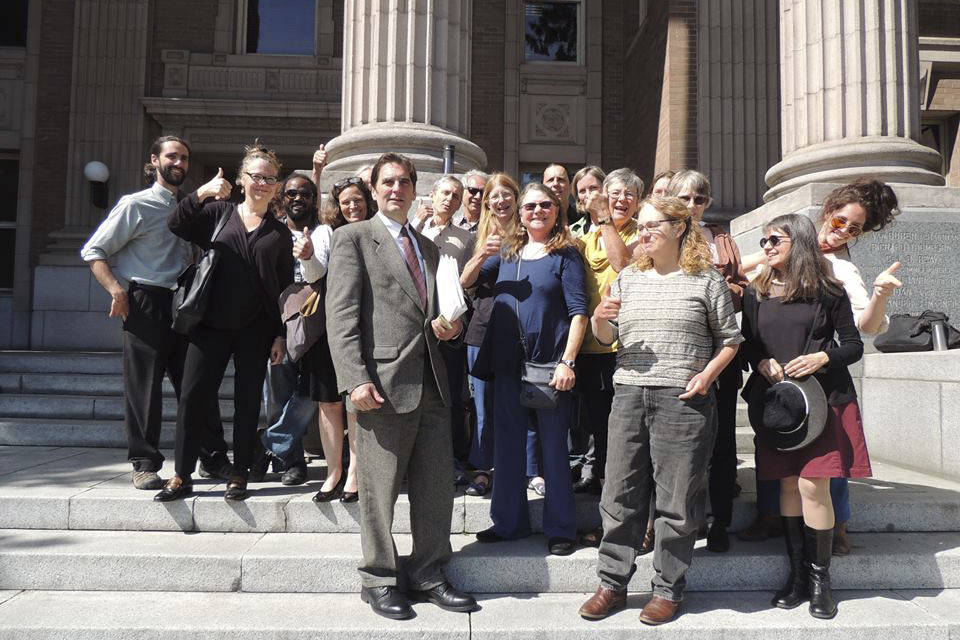In early June, climate activist Ken Ward was convicted of second-degree burglary for closing the emergency shutoff valve on a tar sands pipeline in Skagit County last October — a charge that carries a sentence of up to ten years in prison. Though that amount of time was extremely unlikely, perhaps nearly as unlikely was the sentence delivered Friday: Two days in prison with credit for time served, 30 days of community service, and six months community supervision. Since he spent over a day in jail already following his arrest in October, he will almost certainly spend no time behind bars now at all.
“I’m not going to jail tonight,” a very relieved Ward joked to Seattle Weekly after the hearing. “What could be better?” Having expected he would, at least for some period of time — especially after learning that his legal team would not be able to use the “necessity defense” — the day’s news did come as a welcome suprise.
“Thank all of you — people coming to every single little thing that happened here was just heartwarming,” Ward told the cheering circle of supporters waiting for him outside the Skagit County courthouse Friday morning. “There have been several points in this that were quite scary for me… it was just really comforting to have all this presence.”
Now, Ward said, he hoped that kind of support could continue to be offered to the other four valve-turners who shut down three more pipelines in three other states that day in October, whose trials across the country are yet to come. “At least now you’re not gonna be in jail,” Annette Klapstein told Ward, who closed a pipeline valve in rural Minnesota along with activist Emily Johnston, “and you can come to our trials!”
“Unless I’m doing community service that day,” Ward said. He may or may not be, in part because his legal team is appealing the court’s decision immediately, despite the light sentence, arguing that he should have been allowed to present a proper necessity defense and thus should have a retrial.
In any case, it feels somewhat ironic to Ward and his supporters that the punishment for doing what they see as an enormous act of community service — furthering the conversation about climate change — is, in the end, community service. “I’ll just continue to do what I would ordinarily do in a slightly different form,” Ward said. (Most likely, because Ward has carpentry experience, that would be building homes in Skagit County with Habitat for Humanity.)
Among the more heartening elements of the sentencing hearing, Ward and his supporters report, was that Judge Michael Rickert seemed to weigh heavily Ward’s motivation for committing the crime. According to Ward and other observers, while the prosecutor asked for the maximum sentence, Rickert replied that “I don’t know that imposing… jail time is likely to have any impact on what Mr. Ward does in the future, or people like him.”
Judge: Mr Ward's motive here was purely political, based on his strongly held beliefs that the earth is changing #ClimateTrial
— Jay O'Hara (@oharjo) June 23, 2017
Judge: Do I think that Mr Ward's going to change his views if he spends 90 days in jail? I don't think so. #ClimateTrial
— Jay O'Hara (@oharjo) June 23, 2017
Judge: would putting Mr. Ward in jail stop other people from throwing the tea off the boat? I don't think so. #ClimateTrial
— Jay O'Hara (@oharjo) June 23, 2017
“I think that’s accurate,” Ward said. “People don’t do this because we sit around and calculate the specific consequences.”
“The reality is that people who undertake these acts are moved because they understand deep in their bones the reality of the situation we’re facing,” said Climate Disobedience Center co-founder Jay O’Hara. “It is that reality — that unbearable reality — that moves people to do extraordinary things. … It’s wholly appropriate for that to be seen.”
Although the three other valve-turner trials will be held in other states — i.e., other jurisdictions with other laws — “this is a precedent,” Ward said. Judges are required to look at comparable crimes when sentencing, and “there isn’t anybody else that has ever done this, anywhere, except us. It is the only comparison.”
So far, he said, courts use the power of the state to defend the rights of fossil fuel companies against actions like his. But relatively soon, Ward believes, those tables will turn. Any significant climate action, at this point, “is going to be in the courts, not in Congress — one of the few places where what is factual and what is a lie still matters.”
Climate science predicts that, at current emissions levels, the world locks itself into a 1.5-degree global temperature increase in just four years. It could take two years for Ward’s appeal to go through. “Given the pace at which things are going to hell in a handbasket,” he said, “it could be a very different climate, so to speak, in which we retry [this case].”
sbernard@seattleweekly.com








